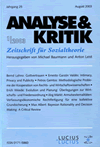Suchergebnisse
"Tobias Steinig"
Titel: Co-deliberation, Joint Decision, and Testimony about Reasons.
Autor: Karen Jones / François Schroeter
Seite: 209-216
Reply to Tobias Steinig, Experts, Teachers and Their Epistemic Roles in Normative and Non-normative Domains, in: Analyse & Kritik 34, 251-274
Abstract: We defend the claim that there can be testimonial transfer of reasons against Steinig’s recent objections. In addition, we argue that the literature on testimony about moral reasons misunderstands what is at stake in the possibility of second-hand orientation towards moral reasons. A moral community faces two different but related tasks: one theoretical (working out what things are of genuine value and how to rank goods and ends) and one practical (engaging in joint action and social coordination). In between, simultaneously theoretical and practical, lies the activity of co-deliberation. Virtuous participation in co-deliberation can require limited moral deference. Refusal to recognize this, combined with excess self-trust, can derail co-deliberation.
Titel: Experts, Teachers and Their Epistemic Roles in Normative and Non-normative Domains
Autor: Tobias Steinig
Seite: 251-274
Comments on Dieter Birnbacher and Karen Jones & François Schroeter
Abstract: Goldman’s notions of expert and testimony in epistemological contexts are extended to normative issues. The result is a sketch of a conceptual framework: several types of experts and roles they can serve in informing not specially qualified recipients are distinguished; differences between experts in epistemological and moral contexts are highlighted. This framework then is the point of reference for claims about experts, expertise and moral testimony in Birnbacher’s and Jones & Schroeter’s contributions to this volume. First, Birnbacher’s worries about the legitimacy of moral philosophers sitting as experts on panels, etc. are allayed in one respect and aggravated in another: there are roles and qualifications open to informants about normative issues, but it is doubtful whether moral philosophers per se are up to each of them. Secondly, Jones & Schroeter’s objection to Hills’s claim that moral testimony cannot orient its recipient properly towards right-making reasons for acting is faulty.

Social Epistemology
2012 (34) Heft 2
Editorial
The research program of social epistemology developed from a critique of philosophical epistemology around thirty years ago. Since then it has attracted ever-growing attention among philosophers. But social epistemology also offers prolific alignments for the social sciences. The starting point of social epistemology is the elementary fact that most of our knowledge is acquired not by our own autonomous exploration but by relying on information from others: on testimony. This is especially true ...